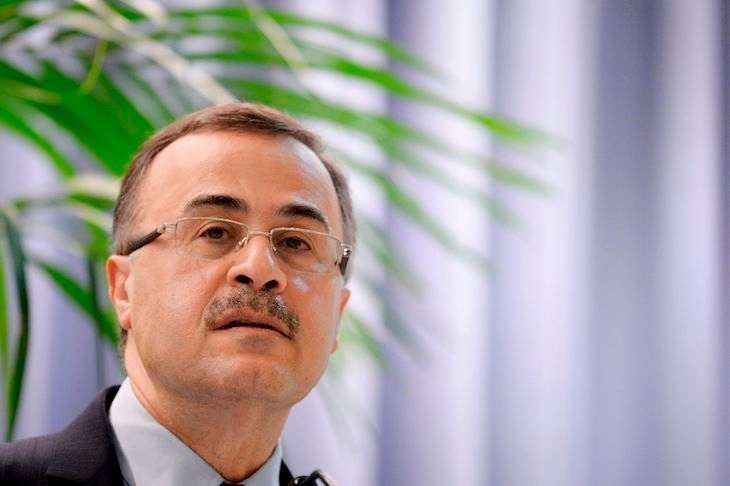Now here’s a tricky question. The world’s largest oil company, potentially worth six times as much as ExxonMobil and ten times as much as Royal Dutch Shell, wants to list its shares on a major stock exchange next year, and has indicated that the choice is between London and New York. The company’s initial public offering of just 5 per cent of its shares promises a $100 billion deal that will generate a fee bonanza for bankers, lawyers and PR men in the chosen marketplace, with several more tranches to come. Clearly London should go all-out to win this lucrative and prestigious piece of business, which would reconfirm the City’s pre-eminent place in the financial world. But the company is Aramco and its owners, the Saudi royal family, are leveraging their power as Middle East and Opec kingpins to demand special treatment, as they always do. Just how far should we bend over to accommodate them?
‘Touch your toes, boys,’ seems to be the answer from the Financial Conduct Authority, led by the Bank of England’s Andrew Bailey. Without actually naming Aramco, the FCA has come up with proposals to allow foreign state-owned companies to list in the LSE’s ‘premium’ category — which normally carries the highest level of governance and requires 25 per cent of the shares to be offered — but with rule changes that blatantly reduce protection for minority investors.
Most importantly, such companies would no longer be required to do business with their controlling state shareholder on arm’s-length commercial terms, so investors will only find out afterwards if the company has sold significant assets back to its government at below-market prices. Nor will investors have a vote on who represents them on the company’s board if they are unhappy with the way their interests are treated.
If the Saudis asked for these exemptions, we might ask why. Do they intend Aramco (which has yet to produce an independent audit of its oil reserves, for example) to conduct itself like other global energy companies whose shares are publicly traded, or to continue as their private fiefdom — but with the benefit of being able to scoop up international investors’ cash? And if New York is their only alternative destination it’s surely questionable whether we need to offer them everything they demand. American regulators would certainly insist on a higher degree of scrutiny, while at the political level there is the unpredictability of Donald Trump to contend with, as well as an embarrassment of lawsuits by victims of the 9/11 attacks accusing the Saudi government of supporting terrorists.
The Brexit angle
Cementing London’s claim to the Aramco mandate was clearly on Theresa May’s agenda when she visited Riyadh in April with LSE chief Xavier Rolet in her entourage — and there we glimpse the Brexit angle to this story. The LSE has been knocked sideways by the collapse of its proposed merger with Deutsche Börse of Germany. For fear of being reduced to a second-tier offshore exchange while Frankfurt seizes its big chance to become the hub of European capital markets, London is eager to attract new business from further afield. And that means welcoming privatisation listings from places not best known for their accounting standards, business probity or general attachment to democracy and the rule of law: Kazakhstan and Russia spring to mind, as well as Saudi Arabia.
Those who rub their hands at the fee prospects of Aramco’s listing argue that this is an example of the need for pragmatism in expanding our trade horizons after Brexit: the City has always done business with Johnny Foreigner, whatever his funny habits, and sophisticated investors will simply price such shares on their merits, marking them down if they have governance faults.
But bending investor-protection rules in order to usher representatives of unsavoury regimes into the LSE’s ‘premium’ enclosure is akin to offering them seats in Wimbledon’s Royal Box, waiving the dress code and saying: ‘Oh no, your eminence, of course you don’t have to switch off your phone.’ Maybe it has to be done, but it smacks of desperation.
Regeneration Game
I’m a huge fan of Game of Thrones, the epic television drama that has returned for a seventh season. This is a show that offers wisdom as well as bloody excitement — and parables for the Conservative leadership struggle, though I hope we’ll never have to watch Theresa May emulate Cersei Lannister’s naked walk of shame. It’s also a rich source of aphorisms for management gurus, emphasising as it does the importance of succession planning, the dangers of debt (especially to the merciless Iron Bank of Braavos), and the need to be prepared for a long economic winter ahead.
But most of all, Game of Thrones shows how the UK’s strengths in the ‘creative industries’ can be deployed to regenerate depressed areas. Much of it is filmed at the Titanic Studios in Belfast’s old shipyards, and on location around Northern Ireland. A quango called Northern Ireland Screen provided £14 million of funding for the first six series, and estimates that £146 million came back in spending, not least by ‘Thronie’ tourists — while a world-class skills base has been built up and busloads of our finest actors have been kept in steady work.
My Belfast correspondent, currently queuing to be a battle-scene extra, tells me ‘the impact of Game of Thrones has been really remarkable, a great boost to the economy of the entire region’. DUP leader Arlene Foster, in her previous role as enterprise minister, was eager to salute the show as the best thing to happen to Northern Ireland’s post-Troubles image abroad — a curious example of a real modern conflict being effaced by a fictional cod-medieval one. And if the show’s contribution passes £200 million after the final series next year, that’s £200 million which Tory ministers won’t have to bung Arlene to keep her onside.







Comments